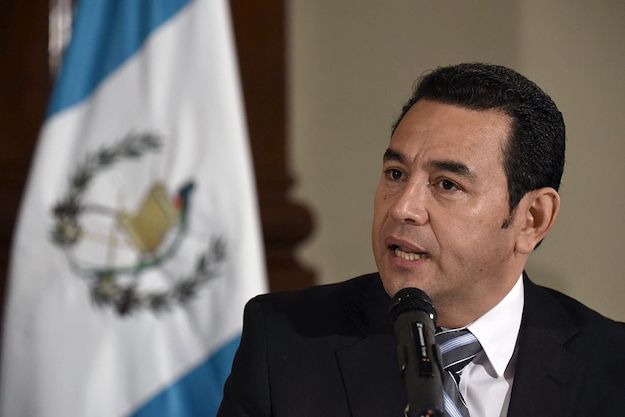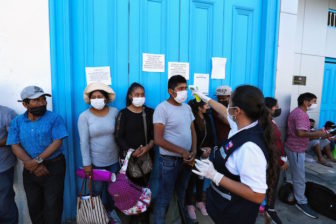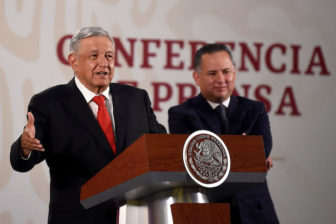It’s not every day that a purportedly friendly foreign nation tries to intimidate the United States by dispatching a fleet of military vehicles to the U.S. Embassy. It is rarer still for the vehicles in question to have been donated by the United States itself and diverted from their intended mission of combatting crime and narcotics trafficking. And it is perhaps unprecedented that such a turn of events would elicit only a tepid response from the U.S. government, followed a short while later by the transfer of additional military jeeps to the foreign government in question.
To say that the Trump Administration’s approach toward Guatemala has taken some bizarre turns in recent months is something of an understatement. At the root of the U.S. policy whiplash is a dispute between Guatemala’s unpopular lame duck president Jimmy Morales and the country’s UN-backed anticorruption watchdog, the International Commission against Impunity in Guatemala (CICIG). Created in 2007 to buttress Guatemala’s police, prosecutors and judges who were being overrun by organized crime, it has saved Guatemala’s democracy on more than one occasion—uncovering a Hollywood-style suicide plot before it could bring down former President Álvaro Colom and uncovering the customs fraud scheme that sent his successor Otto Pérez Molina to jail. Stirred out of their cynicism with politics as usual, Guatemalan citizens rallied en masse to support CICIG and demand an end to corruption.
It is no exaggeration to say that Morales, a political novice and former professional comedian, came to office largely thanks to CICIG, and he began his tenure as a strong supporter. That the president would turn on CICIG when it launched investigations against him and members of his family is hardly surprising. That the Trump administration would break with longstanding bipartisan support for CICIG and tacitly endorse Morales’ efforts to expel the commission came as more of a shock.
For an administration with an almost singular obsession with preventing unauthorized immigration, the attractiveness of an institution that enhances law and order in a principal country of origin for migrants might seem self-evident. Indeed, the Trump administration initially lauded CICIG.
As Morales escalated his fight with CICIG in 2018, however, that changed, in some cases for reasons that appeared to have little to do with the commission itself. Nikki Haley, the then-U.S. Ambassador to the UN, was reportedly impressed by Morales’ decision to move Guatemala’s embassy in Israel to Jerusalem. Senator Marco Rubio, who arguably has the greatest influence on Trump’s Latin America policy, successfully convinced Morales to reject the overtures of China and preserved Guatemala’s recognition of Taiwan. Some Republicans in Congress, including Rubio, bought into a conspiracy theory that CICIG had been infiltrated by Russia in order to persecute a family of Putin critics who purchased fraudulent Guatemalan identities and passports—even after Trump’s own State Department debunked the theory. Efforts to discredit CICIG were aided by a six-figure lobbying campaign financed by a group of Guatemalan business and political elites, some of them implicated in CICIG investigations.
Indeed, many of the most prominent lines of attack against CICIG proved spurious and politically driven. This is not to suggest, however, that the commission should be beyond scrutiny or reproach. Its record before the arrival of current chief Iván Velásquez was inconsistent. Well-intentioned observers have at times questioned its case selection and the almost unhindered authority granted to the UN-appointed commissioner. U.S. officials, even when supportive, voiced concerns about CICIG’s high profile in the media. Some donors wondered whether it was doing enough to transfer capacity to Guatemalan institutions. Cases often stalled in the courts while suspects languished in pretrial detention, though this was largely beyond CICIG’s control. Whatever the relative merits of these arguments, however, Morales’ decision to summarily terminate CICIG’s mandate earlier this month short-circuited any possibility of reforming CICIG for the better or even allowing it to conclude its work in an orderly manner.
CICIG, it turns out, was just the tip of the iceberg. Morales’ next target appears to be the Constitutional Court, which has at various points displayed its independence by ruling against the president. Morales’ solution: orchestrate the removal of three unsympathetic judges, allowing him to pack the court. What follows is uncertain, but there is growing speculation about a slow-motion coup allowing Morales to suspend elections by declaring a state of exception, or at least use the courts to eliminate potential successors who might allow the investigations against him to proceed.
In the meantime, Guatemala’s fragile rule of law gains are already under assault by those who see CICIG’s potential departure as an opportunity to reassert a status quo ante marked by impunity for the powerful. A little over a decade of police reform and professionalization—which helped reduce Guatemala’s homicide rate by about 5 percent annually from 2007-2017—are being controversially dismantled by the Interior Minister. The country’s chief organized crime prosecutor frets publicly about the mafia infiltrating his unit if CICIG departs. And Congress is advancing a proposal to grant amnesty to the relative few individuals convicted of crimes against humanity during Guatemala’s 36-year civil war.
Ironically, Morales’ overreach may offer an opportunity to recalibrate U.S. policy and rebuild bipartisan consensus based on a sober assessment of U.S. interests in Guatemala. Even for CICIG critics and those sympathetic to Morales’ approach to foreign policy, the prospect of the largest country in Central America—through which 1400 metric tons of cocaine were smuggled in 2017—drifting down the path of corrupt misrule will be disquieting. From reducing migration to combating organized crime and drug trafficking, it is hard to see how fundamental U.S. interests are positively impacted by a Guatemalan government willing to undermine law enforcement and democratic institutions to protect itself.
To advance its own stated priorities, not to mention protect the U.S. national interest, it is urgent that the Trump Administration disabuse President Morales of the notion that he is operating with a blank check from Washington. Forty-six members of the U.S. Congress—albeit all Democrats—recently urged Trump to rebuke Morales’ actions with sanctions and aid cutoffs. Such forceful steps are sadly unlikely to materialize. But with an adequate bipartisan push, the Administration could be convinced to communicate red lines to Morales and his backers in the military and private sector, at least in private. If necessary, the CICIG issue should be handled on a separate track while U.S. policy focuses on broader threats to democracy and the rule of law. If CICIG’s popularity among Guatemalan citizens is any indication, Guatemala’s next president will have strong political incentives to maintain or revive it—as Jimmy Morales himself did. For that to happen, however, Guatemalan democracy must first survive Morales’ assault. It’s not too late for Congress and the Trump Administration to get Guatemala right.
—
Camilleri is director of the Peter D. Bell Rule of Law Program at the Inter-American Dialogue. Ziff is a program assistant with the Peter D. Bell Program.






